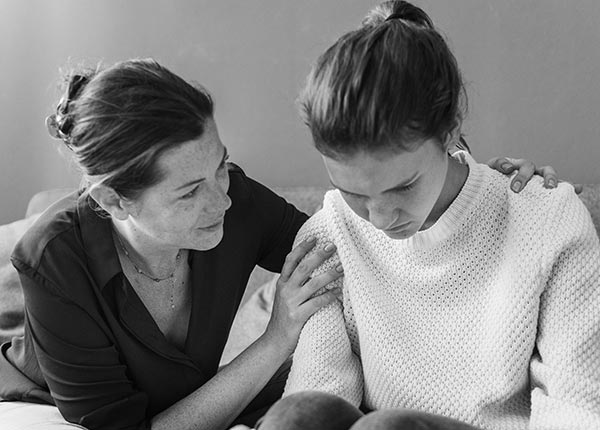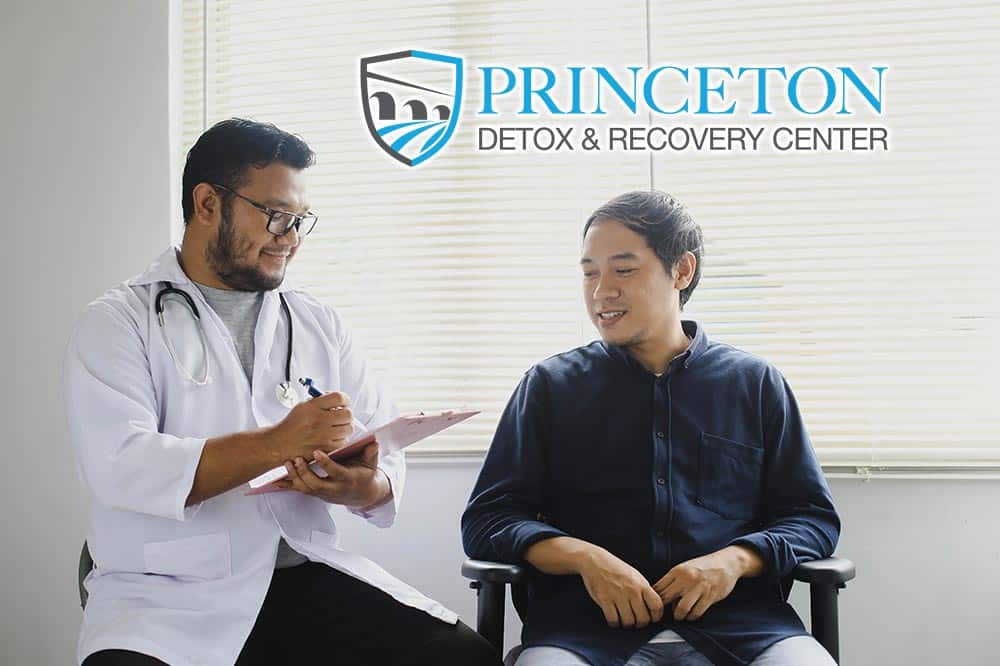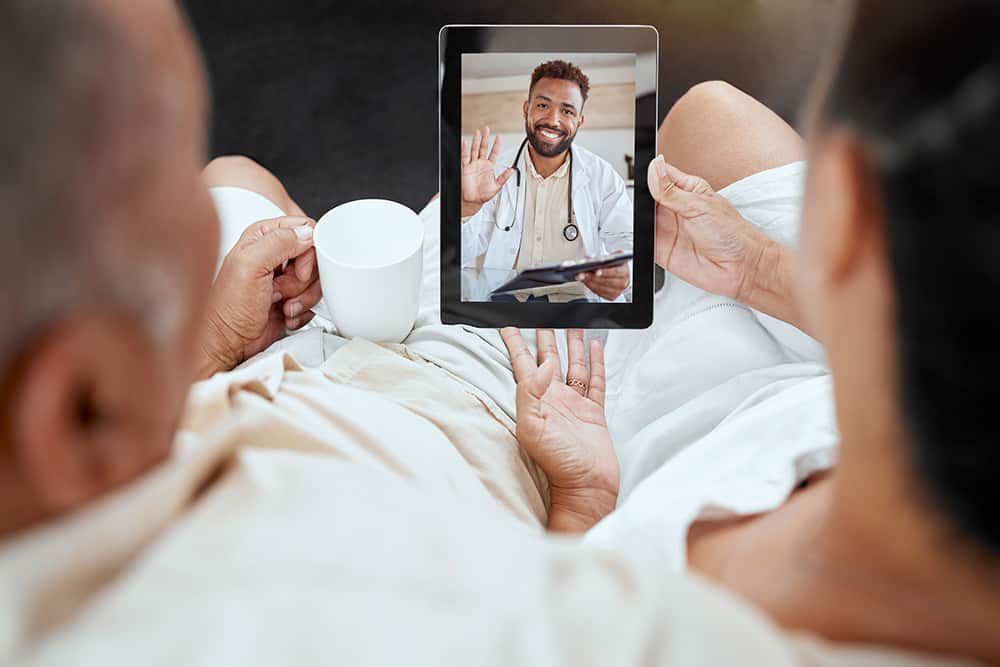Find a Detox Center
in Gloucester County, NJ
If you or someone close to you has been struggling with a diagnosable substance use disorder, you might be wondering where you can turn for professional help. Perhaps you have attempted to quit on your own with limited success. Maybe you have attempted to detox at home, only to find yourself right back where you started within several days — or hours. Because addiction is a chronic and relapsing medical condition, it can be impossible to quit without some degree of clinical treatment. At Princeton Detox & Recovery Center we provide our clients with a safe, pain-free medical detox in a homestyle retreat setting. Our Gloucester County, New Jersey detox has quickly gained a reputation as one of the premier detox centers in the state. To learn more about the services we offer or to begin your personal recovery journey, contact us today.
What Is Medical Detox?
Medical detox refers to the process of undergoing drug and/or alcohol withdrawal in a designated treatment center. Most medical detox programs are inpatient, meaning a client will reside in the center until they have been physically stabilized. The duration of your time in detox depends heavily on several factors, including:
- Your substance of choice.
- The length of time you have been using that substance.
- Whether or not you were combining chemical substances (for example, using prescription painkillers and frequently drinking alcohol).
- Your age, body weight, and gender.
- Whether or not you have gotten sober beforehand.
When you show up to the detox center you choose, you will undergo a detailed medical assessment. This will help the treatment team determine which detox methods are going to be the most beneficial for your unique case. You might be prescribed a detox medication or be tapered off of your drug of choice. In most cases, detox lasts for between three days and two full weeks.
Medical Detox Steps
What steps are involved in the medical detox process? Though it might seem like a given, the first step is acknowledging that professional help has become necessary. Once you make the decision to reach out for help, you will be guided through the remainder of the detox process. Unfortunately, many people avoid seeking the professional help they need because they have misguided beliefs about what medical detox looks like. Undergoing withdrawal can be a comfortable and stress-free process.
In most cases, the steps involved in medical detox look like this:
- Find a detox center that aligns with your personal needs.
- Reach out to the detox center, speak to a Treatment Advisor, and determine a date and a time for your intake.
- When you arrive at the facility, undergo a detailed addiction assessment. This assessment will help the clinical team determine which detox methods will benefit you the most.
- Relax in your bedroom as you undergo a comfortable and safe drug and/or alcohol withdrawal. As symptoms develop, they will be medically treated by our team of licensed medical professionals, ensuring safety and comfort.
- When you feel up to partaking in the services we provide, you are encouraged to engage in individual and group therapy, group workshops and holistic treatment options.
- You work directly with your assigned case manager, who helps you develop a personalized aftercare plan.
- Once you have been physically stabilized, you transition into the next appropriate level of clinical care. This might mean transitioning into a drug and alcohol rehab in Gloucester County, New Jersey or somewhere else in the country.
To learn more about the steps involved in the medical detox process, contact Princeton Detox & Recovery Center today.
We Are Here For You
Let Us Help You Heal
Our Drug & Alcohol detoxification experience is second to none.
Learn how we can help by speaking with one of our Treatment Advisors today.
What to Expect from Medical Detox
What should you expect from the medical detox experience? The answer to this question depends heavily on what type of substance you were using and for how long. For example, the symptoms associated with alcohol detox typically last longer and are more severe than the symptoms associated with stimulant detox. The severity of symptoms will also depend on whether or not you have been struggling with any underlying disorders.

Alcohol Detox
If you or your loved one has been struggling with an alcohol use disorder, medical detox is an important initial step on the road to recovery. The symptoms associated with alcohol withdrawal can be dangerous when left untreated, and can lead to life-threatening complications. The most common symptoms associated with alcohol withdrawal include:
- Persistent headaches.
- Stomach issues like nausea, vomiting and diarrhea.
- Disrupted sleep patterns.
- Body aches and tremors.
- Heart palpitations and mild anxiety.
- Increased blood pressure and heart rate.
- Irritability and agitation.
- Severe anxiety.
- Seizures.
- Delirium tremens (in severe cases of alcohol addiction).
The more severe symptoms of alcohol withdrawal should be closely monitored by a team of medical professionals as pharmaceutical intervention might become necessary. Some medications that might be utilized during the detox process include benzodiazepines, clonidine and anticonvulsant medications (to prevent seizures).
Opioid Detox
If you or someone you love has been using opioid narcotics for any length of time, you will experience symptoms of withdrawal upon abruptly ceased use. At Princeton Detox & Recovery Center we utilize numerous detoxification techniques to help alleviate these symptoms while making them as short-lived as possible. While the symptoms of opiate withdrawal are not generally life-threatening, they can be harshly uncomfortable when left untreated. The most common symptoms associated with opioid withdrawal include:
- Agitation and irritability.
- Muscle aches and general physical discomfort.
- Disrupted sleep patterns/insomnia.
- Flu-like symptoms, such as runny nose, sweating and nausea.
- Increased yawning.
- Body tremors.
- Intense feelings of anxiety and/or depression.
In most cases the symptoms of opioid withdrawal resolve within one week, though the duration of symptoms might be longer depending on the severity of the substance use disorder.
Benzodiazepine Detox
Benzodiazepines are most commonly prescribed for the treatment of moderate or severe anxiety-related disorders. They are also sometimes used for the treatment of insomnia or other sleep-related disorders, for the treatment of seizures and convulsions and finally, for the treatment of symptoms associated with alcohol withdrawal.

Benzodiazepine withdrawal is not just highly uncomfortable, it can be extremely dangerous when not carefully overseen and treated by a team of experienced medical professionals. The most common symptoms of benzodiazepine withdrawal include:
- Severe anxiety and restlessness.
- Irritability and agitation.
- Insomnia and other sleep-related disorders.
- Hand tremors.
- Muscle spasms.
- General aches and pains.
- Stomach issues like nausea, vomiting and diarrhea.
- Intense headaches.
- Profuse sweating/night sweats.
- Disillusionment and feelings of unreality.
- Hallucinations.
- Delirium.
- Depression and suicidal ideation.
- Grand mal seizures.
We utilize medication assisted treatment when necessary, ensuring that clients who have been suffering at the hands of a benzodiazepine addiction are never at risk of danger or discomfort. When our medical team finds tapering necessary, we slowly reduce the amount of benzodiazepines in a client’s system until they are physically stabilized.
Stimulant Detox
Stimulant drugs like methamphetamine, cocaine and prescription stimulants like Adderall and Ritalin can be addictive, and can lead to a wide range of serious personal consequences. When it comes to the symptoms of stimulant withdrawal, the psychological symptoms are often more severe and uncomfortable than the physical symptoms. At our Gloucester County detox we effectively treat the symptoms of stimulant withdrawal with a combination of medication and therapeutic intervention. The most common symptoms of stimulant withdrawal include:
- Extreme fatigue.
- Insomnia.
- Intense anxiety and panic attacks.
- Depressed mood, which can lead to suicidal ideation.
- Drug cravings.
- Increased appetite, which can lead to temporary weight gain.
- Hallucinations, delusions and psychosis.
Psychological symptoms are the main reason why stimulant withdrawal requires medical detox. While all of the other withdrawal symptoms are extremely uncomfortable and can be sufficiently treated in a medical detox facility, psychosis can be life-threatening if not overseen around the clock by a team of medical professionals. Medications will be administered when appropriate, and clients will undergo intensive individual therapy sessions.
Ready To Begin Your Detox?
Don’t let addiction control your life.
Call us today and let’s get you started on the path to a better you.
Why Princeton Detox & Recovery Center?
What sets Princeton Detox & Recovery Center apart from other medical detox centers in the Gloucester County, New Jersey area? First and foremost, we offer highly individualized clinical care — a level of care that you cannot find in any state-funded facility. We remain dedicated to providing each of our clients with integrated care, focusing on mental and emotional well-being as well as physical comfort and stabilization. We also focus on setting our clients up for success on the remainder of their recovery journeys. Our program does not end when a client moves onto the next stage of treatment. Clients have access to an involved alumni program, along with ongoing support from our compassionate staff members.
How to Find the Best Rehab for You in Gloucester County
Finding the best rehab in Gloucester County for you depends heavily on your unique clinical needs. Are you looking for a rehab center that offers gender-specific care? Would you benefit from a Gloucester County rehab that provides dual diagnosis treatment options? There are many options when it comes to addiction treatment, but not all of these options will be the right fit for you. Ask yourself what is important to you. Some factors to keep in mind are:
- The amenities provided by the rehab center.
- The location of the rehab in proximity to other addiction treatment resources, like IOP programs or sober living homes.
- The addiction services offered by the rehab center (look for things like daily group therapy, psychiatric services, addiction assessments and holistic treatment options).
- Whether or not the Princeton rehab accepts your health insurance, and whether or not you can afford to cover any out-of-pocket costs.
- The duration of the treatment program.
- Medication Assisted Treatment (MAT) options (this will be particularly important if you or your loved one has been struggling with an opioid use disorder).
When looking for the best rehab for you in Gloucester County, New Jersey, it is a good idea to reach out for guidance. At Princeton Detox & Recovery Center, we are well-equipped to help you make this important and life-changing decision. Contact us today for more information.
Get Help for Addiction in Gloucester County, NJ
What steps can you take to get help for addiction in Gloucester County? Once you acknowledge help has become necessary, it is a good idea to reach out to a professional for guidance and assistance. At Princeton Detox & Recovery Center we have experienced and compassionate Treatment Advisors standing by to help you. Not only are they knowledgeable about our own program of recovery, but they can point you in the right direction if our program is not the best fit for you or your loved one. We are also happy to point you in the direction of additional recovery-related resources and services.
Contact Us Today to Begin
The only thing standing between you and a life of fulfilled addiction recovery is a phone call. As soon as you make the decision to reach out for help, you will be connected with one of our experienced and compassionate Treatment Advisors who will walk you through our simple and straightforward admissions process. We begin by conducting a brief pre-assessment over the phone. This assessment includes several questions concerning your personal history with substance use, your individualized treatment goals, and the presence of any previously diagnosed, underlying issues. The answers to these questions help our treatment team determine which detox services are going to be the most beneficial for your unique case. Next, we offer a free, no obligation insurance benefit check. At Princeton Detox & Recovery Center we work directly with many major health insurance providers throughout Gloucester County and the remainder of New Jersey, meaning the majority of the services we offer could be covered either partially or in full. Finally, we help arrange local transportation to our Gloucester County detox center, ensuring the safe and timely arrival of you or your loved one. Contact us today to begin your own personal journey of comprehensive healing.

Reviewed for accuracy by:
Amanda Hilzer M.Ed, CAADC, IADAC, ICCS, LCADC, CCS
Amanda graduated from Lehigh University with both an undergraduate degree in Psychology and a Master’s of Education degree in Counseling Psychology and has worked in the field of substance use disorder treatment and mental health treatment as a counselor and as a clinical manager for over 14 years.


































